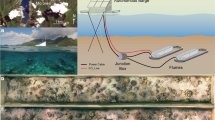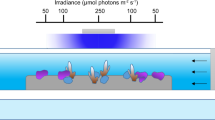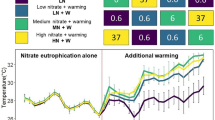Abstract
Ocean acidification (OA) is a major threat to coral reefs, which are built by calcareous species. However, long-term assessments of the impacts of OA are scarce, limiting the understanding of the capacity of corals and coralline algae to acclimatize to high partial pressure of carbon dioxide (\({p}_{\mathrm{CO}_{2}}\)) levels. Species-specific sensitivities to OA are influenced by its impacts on chemistry within the calcifying fluid (CF). Here, we investigate the capacity of multiple coral and calcifying macroalgal species to acclimatize to elevated \({p}_{\mathrm{CO}_{2}}\) by determining their chemistry in the CF during a year-long experiment. We found no evidence of acclimatization to elevated \({p}_{\mathrm{CO}_{2}}\) across any of the tested taxa. The effects of increasing seawater \({p}_{\mathrm{CO}_{2}}\) on the CF chemistry were rapid and persisted until the end of the experiment. Our results show that acclimatization of the CF chemistry does not occur within one year, which confirms the threat of OA for future reef accretion and ecological function.
This is a preview of subscription content, access via your institution
Access options
Access Nature and 54 other Nature Portfolio journals
Get Nature+, our best-value online-access subscription
$29.99 / 30 days
cancel any time
Subscribe to this journal
Receive 12 print issues and online access
$209.00 per year
only $17.42 per issue
Buy this article
- Purchase on Springer Link
- Instant access to full article PDF
Prices may be subject to local taxes which are calculated during checkout






Similar content being viewed by others
Data availability
All data are available on the public data repository BCO-DMO (https://www.bco-dmo.org/dataset/756211).
References
Kroeker, K. J. et al. Impacts of ocean acidification on marine organisms: quantifying sensitivities and interaction with warming. Glob. Change Biol. 19, 1884–1896 (2013).
Eyre, B. D. et al. Coral reefs will transition to net dissolving before end of century. Science 359, 908–911 (2018).
Comeau, S., Edmunds, P. J., Spindel, N. B. & Carpenter, R. C. Fast coral reef calcifiers are more sensitive to ocean acidification in short-term laboratory incubations. Limnol. Oceanogr. 59, 1081–1091 (2014).
Okazaki, R. R. et al. Species-specific responses to climate change and community composition determine future calcification rates of Florida Keys reefs. Glob. Change Biol. 23, 1023–1035 (2017).
Cole, C., Finch, A. A., Hintz, C., Hintz, K. & Allison, N. Effects of seawater \({p}_{\mathrm{CO}_{2}}\) and temperature on calcification and productivity in the coral genus Porites spp.: an exploration of potential interaction mechanisms. Coral Reefs 37, 471–481 (2018).
Tambutté, S. et al. Coral biomineralization: from the gene to the environment. J. Exp. Mar. Biol. Ecol. 408, 58–78 (2011).
McCulloch, M., Falter, J., Trotter, J. & Montagna, P. Coral resilience to ocean acidification and global warming through pH up-regulation. Nat. Clim. Change 2, 623–627 (2012).
Venn, A. A. et al. Impact of seawater acidification on pH at the tissue–skeleton interface and calcification in reef corals. Proc. Natl Acad. Sci. USA 110, 1634–1639 (2013).
Venn, A., Tambutté, E., Holcomb, M., Allemand, D. & Tambutté, S. Live tissue imaging shows reef corals elevate pH under their calcifying tissue relative to seawater. PLoS ONE 6, e20013 (2011).
Comeau, S., Cornwall, C. E., DeCarlo, T. M., Krieger, E. & McCulloch, M. T. Similar controls on calcification under ocean acidification across unrelated coral reef taxa. Glob. Change Biol. 24, 4857–4868 (2018).
McCulloch, M. T., D’Olivo, J. P., Falter, J., Holcomb, M. & Trotter, J. A. Coral calcification in a changing world and the interactive dynamics of pH and DIC upregulation. Nat. Commun. 8, 15686 (2017).
Sevilgen, D. S. et al. Full in vivo characterization of carbonate chemistry at the site of calcification in corals. Sci. Adv. 5, eaau7447 (2019).
Allison, N. et al. Corals concentrate dissolved inorganic carbon to facilitate calcification. Nat. Commun. 5, 5741 (2014).
Hofmann, L. C., Koch, M. & Beer, Dde Biotic control of surface pH and evidence of light-induced H+ pumping and Ca2+-H+ exchange in a tropical crustose coralline alga. PLoS ONE 11, e0159057 (2016).
Cornwall, C. E. et al. Resistance of corals and coralline algae to ocean acidification: physiological control of calcification under natural pH variability. Proc. R. Soc. B 285, 20181168 (2018).
Cornwall, C. E., Comeau, S. & McCulloch, M. T. Coralline algae elevate pH at the site of calcification under ocean acidification. Glob. Change Biol. 23, 4245–4256 (2017).
Schoepf, V., Jury, C. P., Toonen, R. J. & McCulloch, M. T. Coral calcification mechanisms facilitate adaptive responses to ocean acidification. Proc. R. Soc. B 284, 20172117 (2017).
Comeau, S., Cornwall, C. E. & McCulloch, M. T. Decoupling between the response of coral calcifying fluid pH and calcification to ocean acidification. Sci. Rep. 7, 7573 (2017).
D’Olivo, J. P. & McCulloch, M. T. Response of coral calcification and calcifying fluid composition to thermally induced bleaching stress. Sci. Rep. 7, 2207 (2017).
Tambutté, E. et al. Morphological plasticity of the coral skeleton under CO2-driven seawater acidification. Nat. Commun. 6, 7368 (2015).
Barkley, H. C. et al. Changes in coral reef communities across a natural gradient in seawater pH. Sci. Adv. 1, e1500328 (2015).
Fabricius, K. E. et al. Losers and winners in coral reefs acclimatized to elevated carbon dioxide concentrations. Nat. Clim. Change 1, 165–169 (2011).
Wall, M. et al. Internal pH regulation facilitates in situ long-term acclimation of massive corals to end-of-century carbon dioxide conditions. Sci. Rep. 6, 30688 (2016).
Georgiou, L. et al. pH homeostasis during coral calcification in a free ocean CO2 enrichment (FOCE) experiment, Heron Island reef flat, Great Barrier Reef. Proc. Natl Acad. Sci. USA 112, 13219–13224 (2015).
Carpenter, R. C., Lantz, C. A., Shaw, E. & Edmunds, P. J. Responses of coral reef community metabolism in flumes to ocean acidification. Mar. Biol. 165, 66 (2018).
Comeau, S., Carpenter, R. C., Lantz, C. A. & Edmunds, P. J. Ocean acidification accelerates dissolution of experimental coral reef communities. Biogeosciences 12, 365–372 (2015).
Barner, A. K. et al. Generality in multispecies responses to ocean acidification revealed through multiple hypothesis testing. Glob. Change Biol. 24, 4464–4477 (2018).
Holcomb, M. et al. Coral calcifying fluid pH dictates response to ocean acidification. Sci. Rep. 4, 5207 (2014).
Ries, J. B. Skeletal mineralogy in a high-CO2 world. J. Exp. Mar. Biol. Ecol. 403, 54–64 (2011).
Ross, C. L., Falter, J. L. & McCulloch, M. T. Active modulation of the calcifying fluid carbonate chemistry (δ11B, B/Ca) and seasonally invariant coral calcification at sub-tropical limits. Sci. Rep. 7, 13830 (2017).
Ross, C. L., Schoepf, V., DeCarlo, T. M. & McCulloch, M. T. Mechanisms and seasonal drivers of calcification in the temperate coral Turbinaria reniformis at its latitudinal limits. Proc. R. Soc. B 285, 20180215 (2018).
Allison, N. et al. The effect of ocean acidification on tropical coral calcification: insights from calcification fluid DIC chemistry. Chem. Geol. 497, 162–169 (2018).
DeCarlo, T. M., Comeau, S., Cornwall, C. E. & McCulloch, M. T. Coral resistance to ocean acidification linked to increased calcium at the site of calcification. Proc. R. Soc. B 285, 20180564 (2018).
Comeau, S. et al. Pacific-wide contrast highlights resistance of reef calcifiers to ocean acidification. Proc. R. Soc. Lond. B 281, 20141339 (2014).
Putnam, H. M., Mayfield, A. B., Fan, T. Y., Chen, C. S. & Gates, R. D. The physiological and molecular responses of larvae from the reef-building coral Pocillopora damicornis exposed to near-future increases in temperature and \({p}_{\mathrm{CO}_{2}}\). Mar. Biol. 160, 2157–2173 (2013).
Kornder, N. A., Riegl, B. & Figueiredo, J. Thresholds and drivers of coral calcification responses to climate change. Glob. Change Biol. 24, 5084–5095 (2018).
Marshall, A. T., Clode, P. L., Russell, R., Prince, K. & Stern, R. Electron and ion microprobe analysis of calcium distribution and transport in coral tissues. J. Exp. Biol. 210, 2453–2463 (2007).
Edmunds, P. J., Doo, S. S. & Carpenter, R. C. Changes in coral reef community structure in response to year-long incubations under contrasting \({p}_{\mathrm{CO}_{2}}\) regimes. (in review).
Shaw, E. C., Carpenter, R. C., Lantz, C. A. & Edmunds, P. J. Intraspecific variability in the response to ocean warming and acidification in the scleractinian coral Acropora pulchra. Mar. Biol. 163, 210 (2016).
Cornwall, C. E. & Hurd, C. L. Experimental design in ocean acidification research: problems and solutions. ICES J. Mar. Sci. 73, 572–581 (2016).
Hench Episodic circulation and exchange in a wave-driven coral reef and lagoon system. Limnol. Oceanogr. 53, 2681–2694 (2008).
Davies, P. S. Short-term growth measurements of corals using an accurate buoyant weighing technique. Mar. Biol. 101, 389–395 (1989).
Holcomb, M., DeCarlo, T. M., Gaetani, G. A. & McCulloch, M. Factors affecting B/Ca ratios in synthetic aragonite. Chem. Geol. 437, 67–76 (2016).
Foster, G. L. et al. Interlaboratory comparison of boron isotope analyses of boric acid, seawater and marine CaCO3 by MC-ICPMS and NTIMS. Chem. Geol. 358, 1–14 (2013).
Trotter, J. et al. Quantifying the pH ‘vital effect’ in the temperate zooxanthellate coral Cladocora caespitosa: validation of the boron seawater pH proxy. Earth Planet. Sci. Lett. 303, 163–173 (2011).
Klochko, K., Kaufman, A. J., Yao, W., Byrne, R. H. & Tossell, J. A. Experimental measurement of boron isotope fractionation in seawater. Earth Planet. Sci. Lett. 248, 276–285 (2006).
DeCarlo, T. M. et al. Coral calcifying fluid aragonite saturation states derived from Raman spectroscopy. Biogeosciences 14, 5253–5269 (2017).
Acknowledgements
We thank A.-M. Comeau-Nisumaa, J. D’Olivo and P. Edmunds for support for this study. Funding support was as follows: M.T.M. by an ARC Laureate Fellowship (LF120100049) and ARC Centre of Excellence for Coral Reef Studies (CE140100020); S.C. by an ARC DECRA (DE160100668); C.E.C. by ARC Centre of Excellence for Coral Reef Studies (CE140100020) and a Rutherford Discovery Fellowship (Royal Society of New Zealand; RDF-VUW1701); R.C.C. by a National Science Foundation grant OCE 14-15268, the Moorea Coral Reef LTER programme (NSF OCE 12-36905) and from the Gordon and Betty Moore Foundation. The authors also acknowledge the facilities, and scientific and technical assistance, of the University of Western Australia’s Centre for Microscopy, Characterisation and Analysis (CMCA). Research was completed under permits issued by the Haut-commissariat de la République en Polynésie Francaise (DRRT) (Protocole d’Accueil 2015–2016). This is contribution number 286 of the CSUN Marine Biology Program.
Author information
Authors and Affiliations
Contributions
S.C. wrote the paper, prepared the experiment, ran the geochemical analyses and analysed the data. C.E.C. wrote the paper and conducted geochemical analyses. T.M.D. performed geochemical analyses. S.S.D. performed the flume experiment. R.C.C and M.T.M. provided vital laboratory facilities. All authors edited the manuscript, contributed intellectual expertise and approved of its submission.
Corresponding author
Additional information
Peer review information: Nature Climate Change thanks Catherine Cole and the other anonymous reviewer(s) for their contribution to the peer review of this work.
Publisher’s note: Springer Nature remains neutral with regard to jurisdictional claims in published maps and institutional affiliations.
Supplementary information
Supplementary Information
Supplementary Figures 1–3 and Supplementary Tables 1–3.
Rights and permissions
About this article
Cite this article
Comeau, S., Cornwall, C.E., DeCarlo, T.M. et al. Resistance to ocean acidification in coral reef taxa is not gained by acclimatization. Nat. Clim. Chang. 9, 477–483 (2019). https://doi.org/10.1038/s41558-019-0486-9
Received:
Accepted:
Published:
Issue Date:
DOI: https://doi.org/10.1038/s41558-019-0486-9
This article is cited by
-
Shallow and mesophotic colonies of the coral Stylophora pistillata share similar regulatory strategies of photosynthetic electron transport but differ in their sensitivity to light
Coral Reefs (2023)
-
Differences in carbonate chemistry up-regulation of long-lived reef-building corals
Scientific Reports (2023)
-
Calcification in free-living coralline algae is strongly influenced by morphology: Implications for susceptibility to ocean acidification
Scientific Reports (2021)
-
Coral micro- and macro-morphological skeletal properties in response to life-long acclimatization at CO2 vents in Papua New Guinea
Scientific Reports (2021)
-
Resolving the interactions of ocean acidification and temperature on coral calcification media pH
Coral Reefs (2021)



